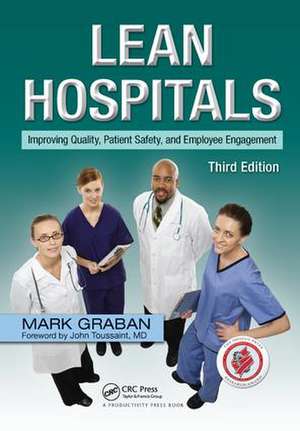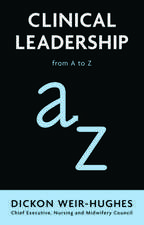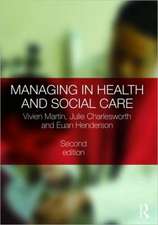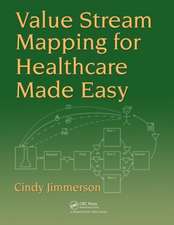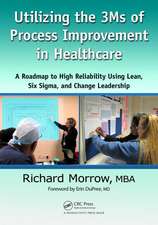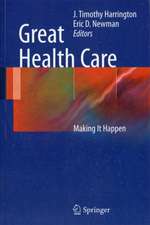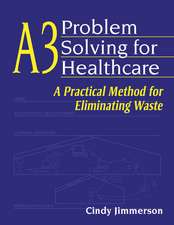Lean Hospitals: Improving Quality, Patient Safety, and Employee Engagement, Third Edition
Autor Mark Grabanen Limba Engleză Hardback – 2 aug 2017
| Toate formatele și edițiile | Preț | Express |
|---|---|---|
| Paperback (1) | 358.31 lei 3-5 săpt. | +28.77 lei 7-11 zile |
| Taylor & Francis – iun 2016 | 358.31 lei 3-5 săpt. | +28.77 lei 7-11 zile |
| Hardback (1) | 1020.98 lei 6-8 săpt. | |
| Taylor & Francis – 2 aug 2017 | 1020.98 lei 6-8 săpt. |
Preț: 1020.98 lei
Preț vechi: 1370.22 lei
-25% Nou
Puncte Express: 1531
Preț estimativ în valută:
195.36€ • 203.99$ • 161.32£
195.36€ • 203.99$ • 161.32£
Carte tipărită la comandă
Livrare economică 15-29 aprilie
Preluare comenzi: 021 569.72.76
Specificații
ISBN-13: 9781138431591
ISBN-10: 1138431591
Pagini: 356
Dimensiuni: 178 x 254 x 30 mm
Greutate: 0.8 kg
Ediția:3 New edition
Editura: Taylor & Francis
Colecția Productivity Press
Locul publicării:Oxford, United Kingdom
ISBN-10: 1138431591
Pagini: 356
Dimensiuni: 178 x 254 x 30 mm
Greutate: 0.8 kg
Ediția:3 New edition
Editura: Taylor & Francis
Colecția Productivity Press
Locul publicării:Oxford, United Kingdom
Public țintă
Professional Practice & DevelopmentRecenzii
"Leaders of today’s healthcare organizations are on a continuous journey to improve results, requiring a relentless focus on improving the underlying process of care delivery and leadership practices. Mark has written a book that provides compelling ideas to help create better places to work, practice medicine, and receive safe, high-quality care."
—Quint Studer, Founder of Studer Group, 2010 recipient of the Malcolm Baldrige National Quality Award, Author of Hardwiring Excellence: Purpose, Worthwhile Work, Making a Difference and Results That Last: Hardwiring Behaviors That Will Take Your Company to the Top
"Mark Graban’s book has documented what is now happening in hospitals all across America as we learn to apply the Toyota Production System methodology to healthcare. This book lays out the nuts and bolts of the Lean methodology and also describes the more difficult challenges, which have to do with managing change. Graban’s book is full of wins — these are the same type of wins that are happening at ThedaCare every day. I wish I could have read this six years ago, as it might have prevented some of the mistakes we made in our Lean transformation journey."
—John S. Toussaint, MD, President/CEO, ThedaCare Center for Healthcare Value
"Mark Graban is the consummate translator of the vernacular of the Toyota Production System into the everyday parlance of health care. With each concept and its application, the reader is challenged to consider what is truly possible in the delivery of health care, if only standardized systems borrowed from reliable industries were implemented. Graban provides those trade secrets in an understandable and transparent fashion."
—Richard P. Shannon, MD, Executive Vice President for Health Affairs, University of Virginia
"There is an enormous shortfall between the healthcare we receive and what we actually get. Mark Graban explains how those in the system can make care delivery better for everyone –patients, providers, and payors."
—Steven J. Spear, Sr. Lecturer at MIT Sloan School of Management and Sr. Fellow at the Institute for Healthcare Improvement, Author of The High Velocity Edge
"Mark Graban has been tirelessly studying the application of LEAN to health care, with an emphasis on respect for the people served by the system as well as the people who provide excellent care. He has an accurate sense of how things work in health systems, which makes his work more meaningful for people who want to make them better."
—Ted Eytan, MD
"The medical community has a tremendous opportunity to learn methods and techniques to improve the quality and efficiency of care and reduce costs, while at the same time engaging the staff in these efforts. Mark Graban has deep experience applying lean in the healthcare field, and in his book provides an outline of how to transfer concepts originally developed in manufacturing into the unique environment of medical care. Don’t miss the opportunity to learn and apply some great ideas in your organization."
—David Meier, Co-Author of the bestselling books, The Toyota Way Fieldbook and Toyota Talent
"The concepts outlined in this book are the most powerful tools that I have ever encountered to foster innovation, ownership, and accountability at the front line staff level. This is a must-read for any leader in today’s increasingly complex healthcare industry."
—Brett Lee, PhD, FACHE, Market Chief Executive Officer, Tenet Healthcare
"The Institute of Medicine (IOM) calls for systems in healthcare that support continuous learning and process improvement, and highlights waste as a fundamental obstacle to attaining highly reliable and value-based healthcare systems. Lean is a proven way to eliminate waste, while hardwiring systems to ensure sustainability. Eliminating waste and engaging employees are the key to value-based medicine, where waste is identified and eliminated, and value emanates seamlessly from continuous process improvement in the rich environment of a continuously learning organization. Lean Hospitals is a foundational text for understanding the concepts and application of continuous process improvement in a healthcare environment, and provides practical guidance and concrete examples to eliminate waste and increase value to the customer."
—Beverly B. Rogers, MD, Chief of Pathology, Children’s Healthcare of Atlanta; Clinical Professor of Pathology, Emory University School of Medicine
"Mark Graban's book will leave you with an appreciation for what Lean is and what it can do for your healthcare organization. Since the original edition in 2008, I have conducted Lean Hospitals book studies for all my staff. Everyone gets a personal copy of Lean Hospitals for the study and to keep as a reference. I look forward to the third edition. It's my Lean bible."
—Jim Adams, Admin Director of Laboratories, Children's Healthcare of Atlanta
"It’s obvious that Mark Graban has spent time in the trenches of healthcare and understands the complexities of applying the Lean philosophy and tools to that environment. If you want to improve your chances of surviving in today’s healthcare system (both literally and figuratively), read this book."
—Dean Bliss, Former Improvement Advisor, Iowa Healthcare Collaborative
"Graban provides a helpful translation of the terms, practices, and tools of Lean thinking into hospitals’ everyday situations and challenges. His book illustrates Lean’s elements with many actual examples of Lean applications in typical hospital practices and procedures. Graban’s book should definitely be on the reading list for those who want to bring the benefits of Lean thinking to healthcare."
—David Mann, Principal, David Mann Lean Consulting
"Lean health care is becoming a global movement. The reasons given are overrun costs, errors that compromise patient safety, time of patients wasted, and general bureaucratic inefficiency. Health care is different than car making. This is true but many, many hospitals are learning from Toyota and making remarkable improvements. The two pillars of the Toyota Way certainly fit the health care environment—Respect for People and Continuous Improvement.
Unfortunately, the remarkable improvements are in specific areas and seem difficult to sustain because of a mysterious ingredient, which the folks at Toyota seem to understand quite well—humans. Health care exists to serve humans and humans provide the services. Humans are far from perfect. Toyota's system is actually designed to support the development of people, not to provide a quick fix set of technical solutions, and this takes time and patience.
Many health care consultants have rebadged themselves as lean consultants and do not understand the real thinking behind the Toyota Way. Mark Graban is an exception. He has worked hard to study the philosophy and stay true to the thinking of Toyota. His book is a welcome translation of the Toyota Way into language any health care professional can understand."
—Jeffrey K. Liker, Professor, University of Michigan, Author of The Toyota Way
—Quint Studer, Founder of Studer Group, 2010 recipient of the Malcolm Baldrige National Quality Award, Author of Hardwiring Excellence: Purpose, Worthwhile Work, Making a Difference and Results That Last: Hardwiring Behaviors That Will Take Your Company to the Top
"Mark Graban’s book has documented what is now happening in hospitals all across America as we learn to apply the Toyota Production System methodology to healthcare. This book lays out the nuts and bolts of the Lean methodology and also describes the more difficult challenges, which have to do with managing change. Graban’s book is full of wins — these are the same type of wins that are happening at ThedaCare every day. I wish I could have read this six years ago, as it might have prevented some of the mistakes we made in our Lean transformation journey."
—John S. Toussaint, MD, President/CEO, ThedaCare Center for Healthcare Value
"Mark Graban is the consummate translator of the vernacular of the Toyota Production System into the everyday parlance of health care. With each concept and its application, the reader is challenged to consider what is truly possible in the delivery of health care, if only standardized systems borrowed from reliable industries were implemented. Graban provides those trade secrets in an understandable and transparent fashion."
—Richard P. Shannon, MD, Executive Vice President for Health Affairs, University of Virginia
"There is an enormous shortfall between the healthcare we receive and what we actually get. Mark Graban explains how those in the system can make care delivery better for everyone –patients, providers, and payors."
—Steven J. Spear, Sr. Lecturer at MIT Sloan School of Management and Sr. Fellow at the Institute for Healthcare Improvement, Author of The High Velocity Edge
"Mark Graban has been tirelessly studying the application of LEAN to health care, with an emphasis on respect for the people served by the system as well as the people who provide excellent care. He has an accurate sense of how things work in health systems, which makes his work more meaningful for people who want to make them better."
—Ted Eytan, MD
"The medical community has a tremendous opportunity to learn methods and techniques to improve the quality and efficiency of care and reduce costs, while at the same time engaging the staff in these efforts. Mark Graban has deep experience applying lean in the healthcare field, and in his book provides an outline of how to transfer concepts originally developed in manufacturing into the unique environment of medical care. Don’t miss the opportunity to learn and apply some great ideas in your organization."
—David Meier, Co-Author of the bestselling books, The Toyota Way Fieldbook and Toyota Talent
"The concepts outlined in this book are the most powerful tools that I have ever encountered to foster innovation, ownership, and accountability at the front line staff level. This is a must-read for any leader in today’s increasingly complex healthcare industry."
—Brett Lee, PhD, FACHE, Market Chief Executive Officer, Tenet Healthcare
"The Institute of Medicine (IOM) calls for systems in healthcare that support continuous learning and process improvement, and highlights waste as a fundamental obstacle to attaining highly reliable and value-based healthcare systems. Lean is a proven way to eliminate waste, while hardwiring systems to ensure sustainability. Eliminating waste and engaging employees are the key to value-based medicine, where waste is identified and eliminated, and value emanates seamlessly from continuous process improvement in the rich environment of a continuously learning organization. Lean Hospitals is a foundational text for understanding the concepts and application of continuous process improvement in a healthcare environment, and provides practical guidance and concrete examples to eliminate waste and increase value to the customer."
—Beverly B. Rogers, MD, Chief of Pathology, Children’s Healthcare of Atlanta; Clinical Professor of Pathology, Emory University School of Medicine
"Mark Graban's book will leave you with an appreciation for what Lean is and what it can do for your healthcare organization. Since the original edition in 2008, I have conducted Lean Hospitals book studies for all my staff. Everyone gets a personal copy of Lean Hospitals for the study and to keep as a reference. I look forward to the third edition. It's my Lean bible."
—Jim Adams, Admin Director of Laboratories, Children's Healthcare of Atlanta
"It’s obvious that Mark Graban has spent time in the trenches of healthcare and understands the complexities of applying the Lean philosophy and tools to that environment. If you want to improve your chances of surviving in today’s healthcare system (both literally and figuratively), read this book."
—Dean Bliss, Former Improvement Advisor, Iowa Healthcare Collaborative
"Graban provides a helpful translation of the terms, practices, and tools of Lean thinking into hospitals’ everyday situations and challenges. His book illustrates Lean’s elements with many actual examples of Lean applications in typical hospital practices and procedures. Graban’s book should definitely be on the reading list for those who want to bring the benefits of Lean thinking to healthcare."
—David Mann, Principal, David Mann Lean Consulting
"Lean health care is becoming a global movement. The reasons given are overrun costs, errors that compromise patient safety, time of patients wasted, and general bureaucratic inefficiency. Health care is different than car making. This is true but many, many hospitals are learning from Toyota and making remarkable improvements. The two pillars of the Toyota Way certainly fit the health care environment—Respect for People and Continuous Improvement.
Unfortunately, the remarkable improvements are in specific areas and seem difficult to sustain because of a mysterious ingredient, which the folks at Toyota seem to understand quite well—humans. Health care exists to serve humans and humans provide the services. Humans are far from perfect. Toyota's system is actually designed to support the development of people, not to provide a quick fix set of technical solutions, and this takes time and patience.
Many health care consultants have rebadged themselves as lean consultants and do not understand the real thinking behind the Toyota Way. Mark Graban is an exception. He has worked hard to study the philosophy and stay true to the thinking of Toyota. His book is a welcome translation of the Toyota Way into language any health care professional can understand."
—Jeffrey K. Liker, Professor, University of Michigan, Author of The Toyota Way
Notă biografică
Mark Graban is an internationally recognized expert in the field of Lean healthcare, as a consultant, author, keynote speaker, and blogger. Mark is also co-author, with Joe Swartz, of the book Healthcare Kaizen: Engaging Front-Line Staff in Sustainable Continuous Improvements . He has been recognized twice (for this book and?Healthcare Kaizen ) as the recipient of the prestigious Shingo Research & Professional Publication Award.?
Mark is an experienced change agent, with a background in industrial and mechanical engineering and an MBA from the MIT Sloan Leaders for Global Operations Program. Prior to healthcare, Mark worked in multiple industries, including automotive (General Motors), electronics (Dell), and industrial products (Honeywell). At Honeywell, Mark was certified as a Lean expert (Lean Black Belt).Since August 2005, Mark has worked exclusively in healthcare, where he has coached Lean teams at client sites in North America and the United Kingdom, including medical laboratories, hospitals, and primary care clinics.? Mark’s motivation is to apply Lean and Toyota Production System principles to improve quality of care and patient safety, to improve the customer/patient experience, to help the development of medical professionals and employees, to make healthcare more affordable, and to help build strong organizations for the long term.From June 2009 to June 2011, Mark was a senior fellow with the Lean Enterprise Institute, a not-for-profit education organization that is a leading voice in the Lean world. In this role, Mark also served as the director of communications & technology for the Healthcare Value Network, a collaboration of healthcare organizations from across North America, a partnership between the Lean Enterprise Institute and the ThedaCare Center for Healthcare Value. Mark continues as a faculty member for the Lean Enterprise Institute and the ThedaCare Center.In June 2011, Mark also joined the software company KaiNexus to help further their mission of spreading continuous improvement, while continuing his other work and activities. He also serves on the board of the Louise H. Batz Patient Safety Foundation.Mark was raised in Livonia, Michigan, and currently resides in Texas with his wife, Amy.? To Interact with Mark, please visit www.LeanHospitalsBooks.com or www.MarkGraban.com.
Mark is an experienced change agent, with a background in industrial and mechanical engineering and an MBA from the MIT Sloan Leaders for Global Operations Program. Prior to healthcare, Mark worked in multiple industries, including automotive (General Motors), electronics (Dell), and industrial products (Honeywell). At Honeywell, Mark was certified as a Lean expert (Lean Black Belt).Since August 2005, Mark has worked exclusively in healthcare, where he has coached Lean teams at client sites in North America and the United Kingdom, including medical laboratories, hospitals, and primary care clinics.? Mark’s motivation is to apply Lean and Toyota Production System principles to improve quality of care and patient safety, to improve the customer/patient experience, to help the development of medical professionals and employees, to make healthcare more affordable, and to help build strong organizations for the long term.From June 2009 to June 2011, Mark was a senior fellow with the Lean Enterprise Institute, a not-for-profit education organization that is a leading voice in the Lean world. In this role, Mark also served as the director of communications & technology for the Healthcare Value Network, a collaboration of healthcare organizations from across North America, a partnership between the Lean Enterprise Institute and the ThedaCare Center for Healthcare Value. Mark continues as a faculty member for the Lean Enterprise Institute and the ThedaCare Center.In June 2011, Mark also joined the software company KaiNexus to help further their mission of spreading continuous improvement, while continuing his other work and activities. He also serves on the board of the Louise H. Batz Patient Safety Foundation.Mark was raised in Livonia, Michigan, and currently resides in Texas with his wife, Amy.? To Interact with Mark, please visit www.LeanHospitalsBooks.com or www.MarkGraban.com.
Cuprins
The Need for Lean Hospitals. Overview of Lean for Hospitals and Health Systems. Value and Waste. Observing the Process and Value Streams. Standardized Work as a Foundation of Lean. Lean Methods: Visual Management, 5S, and Kanban. Proactive Root Cause Problem Solving. Preventing Errors and Harm. Improving Flow. Lean Design. Engaging and Leading Employees. Getting Started with Lean. A Vision for a Lean Hospital and Health System. Glossary. Index.
Descriere
Organizations around the world are using Lean to redesign care and improve processes in a way that achieves and sustains meaningful results for patients, staff, physicians, and health systems
